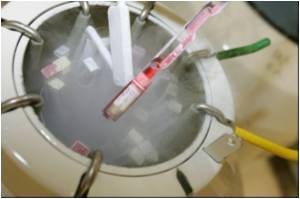
Scientists know that among an embryo's first major developments is the establishment of its dorsoventral axis, which runs from its back to its belly. Determining how this axis development unfolds -- specifically the presence and location of proteins during the process -- requires the ability to simultaneously monitor large numbers of embryos with different genetic backgrounds at several time points.
"Collecting and analyzing the signaling and transcriptional patterns of the dorsoventral axis typically requires manual manipulation of individual embryos to stand them on their ends, making it difficult to conduct high-throughput experiments that can achieve statistically significant results," said Hang Lu, an associate professor in the Georgia Tech School of Chemical & Biomolecular Engineering.
To enable large-scale quantitative analyses of protein positional information along the dorsoventral axis, Lu designed a microfluidic device that reliably and robustly orients several hundred embryos in just a few minutes.
Source-Eurekalert








